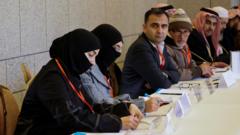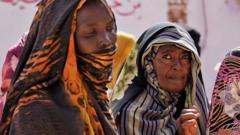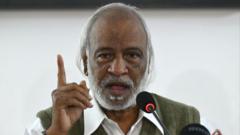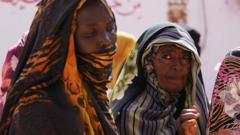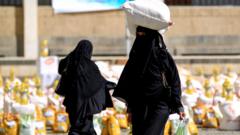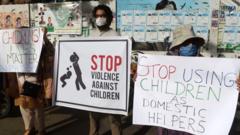As Myanmar's economic situation deteriorates due to ongoing conflict, an alarming trend of illegal kidney sales has emerged among impoverished villagers. The accounts of individuals willing to risk their health for financial relief highlight both the desperation and ingenuity born from a shattered economy.
Myanmar's Dire Kidney Trade: Villagers Turn to Illegal Sales Amid Economic Strife

Myanmar's Dire Kidney Trade: Villagers Turn to Illegal Sales Amid Economic Strife
In the wake of Myanmar's civil unrest, desperate villagers share their stories of illegal kidney sales as a means to alleviate financial burdens.
Zeya, a pseudonym for a farm worker, is amongst the villagers who turned to selling a kidney to help escape debts and buy land. After the military coup in 2021 ignited civil war and severely impacted the economy, many families found themselves struggling to make ends meet. Living in a dilapidated home with limited resources, Zeya's decision was driven by necessity. He managed to connect with a broker who arranged the sale and facilitated his transplant in India.
Despite knowing the legal risks, Zeya described the experience of selling his kidney as a last resort, where brokers played a crucial role in navigating the pitfalls of illegal organ trade. By presenting false familial ties, he was able to pose as a relative of the woman receiving his kidney. Zeya's compensation ranged from $1,700 to $2,700, an amount that profoundly impacted his financial situation.
Another villager, Myo Win, faced similar circumstances, confessing he was unaware of the legal implications surrounding the transaction. Operators often deceive donors by masking the illegal nature of their actions, cultivating a shadow industry fueled by poverty and desperation.
The health crisis triggered by rising unemployment and falling living standards has transformed many into reluctant participants in illegal organ trading, with donors often receiving only a fraction of the expected compensation while risking their health. Reports indicate that organ brokers are operating across Myanmar and India, employing deceptive tactics and falsified documents to facilitate kidney transactions.
Recent investigations in India have revealed more widespread illegal practices, leading to arrests connected to similar kidney rackets, yet the innocent struggle of individuals like Zeya and Myo Win continues to unfold. Malaysian villagers, now hesitant to recommend similar actions to others, underscore both the pain of their choices and the societal challenges that led them to such drastic measures.
They acknowledge the potentially severe long-term health consequences of their decisions, weighed against their dire financial situations. Despite Zeya managing to settle some of his debts and Myo Win expressing no immediate regrets, both implore others to reconsider such steps due to the inherent risks involved.
As Myanmar’s humanitarian crisis grows, the plight of those participating in illegal organ trade becomes more dire. With poverty affecting nearly half of the population, the stories of villagers like Zeya and Myo Win reveal the desperate measures some are compelled to take, revealing a stark picture of survival amidst economic turmoil. The pressing need for social support systems becomes clear, as does the urgency of addressing the illegal trafficking and exploitation within the organ trade.
Despite knowing the legal risks, Zeya described the experience of selling his kidney as a last resort, where brokers played a crucial role in navigating the pitfalls of illegal organ trade. By presenting false familial ties, he was able to pose as a relative of the woman receiving his kidney. Zeya's compensation ranged from $1,700 to $2,700, an amount that profoundly impacted his financial situation.
Another villager, Myo Win, faced similar circumstances, confessing he was unaware of the legal implications surrounding the transaction. Operators often deceive donors by masking the illegal nature of their actions, cultivating a shadow industry fueled by poverty and desperation.
The health crisis triggered by rising unemployment and falling living standards has transformed many into reluctant participants in illegal organ trading, with donors often receiving only a fraction of the expected compensation while risking their health. Reports indicate that organ brokers are operating across Myanmar and India, employing deceptive tactics and falsified documents to facilitate kidney transactions.
Recent investigations in India have revealed more widespread illegal practices, leading to arrests connected to similar kidney rackets, yet the innocent struggle of individuals like Zeya and Myo Win continues to unfold. Malaysian villagers, now hesitant to recommend similar actions to others, underscore both the pain of their choices and the societal challenges that led them to such drastic measures.
They acknowledge the potentially severe long-term health consequences of their decisions, weighed against their dire financial situations. Despite Zeya managing to settle some of his debts and Myo Win expressing no immediate regrets, both implore others to reconsider such steps due to the inherent risks involved.
As Myanmar’s humanitarian crisis grows, the plight of those participating in illegal organ trade becomes more dire. With poverty affecting nearly half of the population, the stories of villagers like Zeya and Myo Win reveal the desperate measures some are compelled to take, revealing a stark picture of survival amidst economic turmoil. The pressing need for social support systems becomes clear, as does the urgency of addressing the illegal trafficking and exploitation within the organ trade.


